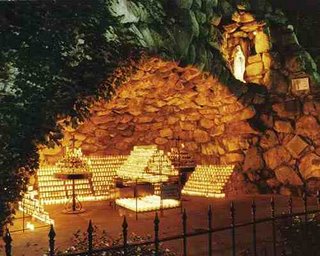I've spent most every waking minute since I've been down here with my nose in one book or another. I'm learning, but it's exhausting. Last night I finished
The Beginnings of the Church by Frederick Cwiekowski, which Richard McBrien and many other ecclesiologists consider the best synthesis of, well, the beginnings of the church, from Jesus through what's called the post-apostolic period, the third generation of Christianity (which ends somewhere in the early second century).
What do I take away from the book? Two things mainly. First, the vast diversity even within the church under the apostles. The principal point of tension was what to do with the relationship between Judaism and Christianity. There were at least four major schools of thought about this, from the belief that no adherence to Judaism was at all necessary (on the far left) to the belief that non-Jewish Christians should be circumcised and follow Jewish dietary laws (on the far right). Peter and Paul, who were bringing the gospel to Gentiles, brought their concerns about this to Jerusalem, where a council (presided over by James the brother of the Lord), sorted it out. Ultimately, the decision was to affirm the Gentile majority's belief that it was not necessary for Gentile converts to be circumcised and follow the food laws. But interestly, James tells Peter and Paul and the rest on their side of the debate not to flaunt their freedoms. In other words, don't grab a piece of bacon, wave it in the face of Jewish brother in Christ, and tell him or her about how great it is. James exercised the role proper to a leader. He affirmed freedom, but also constraint. Too often we approach matters in the church today in a one-sided way. "Well, it's my Christian right to do this or that, so to heck with the rest of you." But of course exercising a right is not all that matters. Communion, love, and deference for one's brothers and sisters in the faith matters too.
At any rate, I learned not to make the mistake of assuming that somewhere back there in the past was this universal Christian viewpoint. Differences among Christians is nothing new. It has always, always, always been thus.
I was also struck with all the conflict in the early church. Paul and Peter, the principal founders of our faith (after Jesus, of course) really had it in for each other at one point, though they did seem to resolve their differences. The churches in Asia Minor had big beefs with the church in Jerusalem. In fact, it may not be an exaggeration to say that we wouldn't have much of the New Testament if it weren't for ecclesial conflicts because almost all of Paul's writings, which make up the bulk of the NT, were responses to one conflict or another. It's really quite remarkable.
And comforting too in a way, especially as I watch with some fear the decisions being made at the general convention of the Episcopal Church (USA) of which I'm a loyal member. I am glad we've reached a point in history when we can elect a woman as presiding bishop, but at what cost? Will the churches of the south, churches largely made up of the poor, the very people with whom Jesus called us to identify most--will they walk away? Are we really facing the first Anglican schism?
Oh Father, grant us strength and resolve to face our differences with grace and understanding. I pray it is not so that these differences necessitate a formal division. It grieves me.
God grant us peace.



